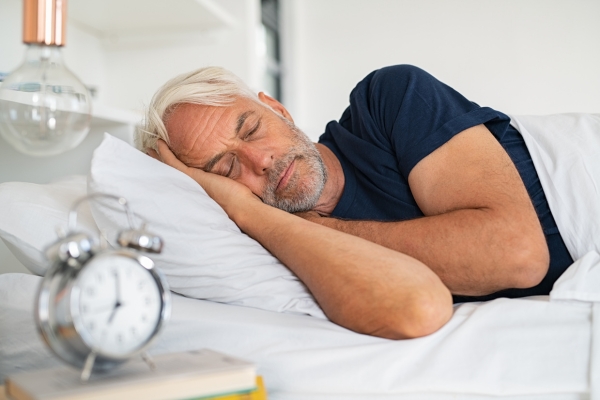In our modern, bustling lives, millions rely on caffeine as a daily staple.
Whether it’s the morning coffee that jumpstarts our day or the afternoon tea for a vital energy lift, caffeine is hailed for its power to sharpen focus and ward off tiredness.
However, while the immediate benefits of caffeine are widely appreciated, its lingering effects on the body, particularly on sleep, are often overlooked.
Caffeine metabolism, the process by which the body breaks down and eliminates caffeine, plays a crucial role in determining how long these effects last.
For some, caffeine consumed even early in the afternoon can disrupt sleep patterns, leading to difficulties falling asleep or staying asleep at night.
This is where rutaecarpine can help.
Rutaecarpine has garnered attention for its potential to accelerate the metabolism of caffeine, thus helping to mitigate its sleep-disrupting effects.
By enhancing the body’s ability to clear caffeine more rapidly, rutaecarpine offers a promising solution for those looking to enjoy their favorite caffeinated beverages without compromising their sleep quality.

Understanding Caffeine and Its Effects
Caffeine is a natural stimulant predominantly found in coffee, tea, energy drinks, and chocolate.
It works by inhibiting the action of adenosine, a neurotransmitter that promotes sleep, thereby increasing alertness and reducing fatigue.
The effects of caffeine are felt quickly, with blood levels peaking within 15 to 45 minutes after ingestion.
While the immediate energizing effects of caffeine are widely recognized, its broader impact on bodily functions—including heart rate, blood pressure, and digestion—is substantial and varied.
The Half-Life of Caffeine
The concept of half-life is crucial to understanding how long caffeine’s effects last in the body.
The half-life of caffeine—the time required for the body to eliminate half of the caffeine consumed—varies significantly among individuals, generally ranging from 3 to 7 hours. [1]
Keep in mind that this is just to eliminate HALF of the caffeine in your system.
This variation is influenced by numerous factors, such as age, liver function, genetic makeup, pregnancy, and even smoking habits.
For example, the metabolism of caffeine is accelerated in smokers but slowed down in pregnant women, highlighting the diverse factors that affect caffeine clearance from the body.
Caffeine’s Impact on Sleep
The enduring presence of caffeine can significantly interfere with sleep quality and patterns.
Consuming caffeine even 6 hours before bedtime can notably reduce total sleep time, often by an hour or more.
This disruption manifests as difficulty in falling asleep, decreased deep sleep duration, and increased nocturnal awakenings.
The resultant sleep deprivation can adversely affect cognitive functions, mood, and overall health, underscoring the delicate balance between caffeine intake and sleep wellness. [2]
The Role of Rutaecarpine in Caffeine Metabolism
Rutaecarpine is an intriguing compound extracted from the fruit of the Evodia rutaecarpa plant, a species native to traditional Chinese medicine.
Historically, this plant and its compounds have been used for their warming properties and to alleviate various ailments, ranging from gastrointestinal distress to hypertension.
Only in recent times has rutaecarpine caught the attention of modern science, particularly for its potential interaction with caffeine metabolism.
How Rutaecarpine Works
Rutaecarpine specifically targets the cytochrome P450 1A2 enzyme, which plays a pivotal role in breaking down caffeine. [3]
By stimulating this enzyme’s activity, rutaecarpine can expedite the clearance of caffeine from the bloodstream, thereby potentially mitigating the stimulant’s sleep-disruptive effects.
This accelerated metabolism means that the body can eliminate caffeine more efficiently, helping individuals who are sensitive to caffeine or those who consume it late in the day to avoid its impact on sleep.

Scientific Studies and Research on Rutaecarpine
The exploration of rutaecarpine’s effects, particularly its role in enhancing caffeine metabolism, has been a focal point of numerous scientific inquiries.
While the body of research is burgeoning, with much still to be understood, the preliminary results from animal-based studies paint an encouraging picture of rutaecarpine’s potential.
Animal-Based Studies and Their Implications
A considerable portion of the research into rutaecarpine’s effects on caffeine metabolism has been conducted using animal models, which offer valuable insights into the compound’s mechanisms and potential benefits.
These studies have primarily focused on how rutaecarpine influences the activity of specific liver enzymes responsible for metabolizing caffeine.
One notable study observed that when rodents were administered rutaecarpine, there was a marked increase in the activity of the cytochrome P450 1A2 enzyme, a key player in caffeine’s metabolic pathway. [3]
This enzyme’s enhanced activity led to a significant uptick in the metabolism and subsequent excretion of caffeine. The results indicated that rutaecarpine could effectively shorten caffeine’s half-life in the body, thus potentially diminishing its stimulatory effects more rapidly.
Another study explored the effect of rutaecarpine on sleep patterns in caffeine-administered rodents. [4]
The animals that received rutaecarpine alongside caffeine exhibited less disruption in their sleep architecture compared to those that only received caffeine.
This suggests that rutaecarpine not only accelerates caffeine clearance but may also mitigate its adverse effects on sleep.

Benefits of Reducing Caffeine Levels Before Bedtime
Sleep is a fundamental pillar of overall health, as vital as regular exercise and a balanced diet.
Quality sleep contributes to a wide array of health benefits, including enhanced cognitive function, emotional regulation, and physical health.
It plays a pivotal role in brain function, aiding in memory consolidation, learning, and decision-making processes.
Furthermore, adequate sleep is essential for the repair and rejuvenation of the heart and blood vessels, thus playing a critical role in cardiovascular health.
It also supports growth and stress regulation and bolsters the immune system, making it a key factor in disease prevention and longevity.
Enhancing Sleep Quality by Lowering Caffeine Intake
Caffeine, particularly when consumed late in the day, can significantly impact one’s ability to fall asleep and the quality of sleep obtained.
Its stimulatory effects can prolong sleep latency—the time it takes to fall asleep—and can decrease the duration of deep sleep, the restorative phase of the sleep cycle.
By reducing caffeine levels in the evening, individuals can mitigate these effects, leading to quicker onset of sleep and more time spent in deep sleep stages.
This can result in a more restful and uninterrupted sleep experience, leaving individuals feeling more refreshed and alert upon waking.
Reducing caffeine intake before bedtime can also help in regulating the body’s internal clock, or circadian rhythm, which governs the sleep-wake cycle.
Late-day caffeine consumption can shift this internal clock later, making it harder to fall asleep at the desired time.
By managing caffeine consumption, individuals can maintain a more consistent sleep schedule, further enhancing sleep quality and overall well-being.
Long-Term Health Benefits of Managed Caffeine Consumption
Effectively managing caffeine consumption can have profound implications for long-term health and well-being.
Improved sleep quality and duration can lead to better cognitive function, reduced risk of chronic diseases, improved mental health, and enhanced quality of life.
For instance, adequate sleep has been linked to a lower risk of developing conditions such as obesity, type 2 diabetes, heart disease, and depression.
Furthermore, by reducing reliance on caffeine to combat daytime sleepiness, individuals can foster a healthier sleep-wake cycle, leading to more natural energy levels and reduced stress on the body’s systems.
This can also decrease the likelihood of developing a tolerance to caffeine, where increasing amounts are needed to achieve the same stimulatory effects, thus promoting a healthier relationship with caffeine and stimulants in general.

How to Use Rutaecarpine for Better Sleep
What if drinking caffeine later in the day is a requirement?
Is there a way to drink caffeine and still get a great night of sleep?
Incorporating rutaecarpine into your daily routine can be a strategic approach to managing caffeine’s effects on sleep.
Here are some guidelines to effectively use rutaecarpine, optimize its benefits, and enhance your overall sleep quality.
Incorporating Rutaecarpine into Your Routine
Start by monitoring your daily caffeine consumption to understand your baseline. Note the types of caffeinated beverages you consume and their timing, especially in relation to your bedtime.
It’s important to find a rutaecarpine supplement that is high quality and contains other scientifically proven ingredients for sleep.
Rutaecarpine works great on its own, but it works even better when combined with ingredients like GABA, valerian root, magnesium, and lemon balm.
Naturally, for best results, incorporate rutaecarpine into your evening routine consistently.
Optimal Timing for Rutaecarpine
Here are some of the best times to take rutaecarpine:
Evening Use: Considering rutaecarpine’s role in accelerating caffeine metabolism, it’s most effective when taken in the evening, a few hours before bedtime. This timing helps clear residual caffeine from your system, reducing its impact on your ability to fall asleep and enjoy uninterrupted sleep.
Post-Caffeine Consumption: If you consume caffeine later in the day, consider taking rutaecarpine shortly after your last caffeinated beverage. This can help expedite the clearance of caffeine, aligning with your body’s natural preparation for sleep.

Sleep Revive: A Trusted Source of Rutaecarpine
While rutaecarpine plays a pivotal role in accelerating the metabolism of caffeine, thereby reducing its sleep-disruptive effects, Sleep Revive takes a broader approach to sleep enhancement.
It complements rutaecarpine’s benefits by addressing other common barriers to sleep, such as stress, tension, and an overactive mind.
Together, rutaecarpine and Sleep Revive offer a comprehensive solution to those seeking to improve their sleep quality, especially for individuals sensitive to caffeine or those struggling with sleep disturbances.
Key Ingredients in Sleep Revive
Other than rutaecarpine, here are some of the scientifically proven ingredients in Sleep Revive:
GABA (Gamma-Aminobutyric Acid): This naturally occurring amino acid acts as a neurotransmitter in the brain, helping to calm nervous activity. GABA promotes relaxation and reduces anxiety, making it easier to fall asleep and stay asleep.
Valerian Root: Known for its sedative properties, valerian root has been used for centuries to promote relaxation and improve sleep quality. It works by increasing levels of GABA in the brain, further enhancing the calming effects of Sleep Revive.
Magnesium: An essential mineral for overall health, magnesium plays a crucial role in supporting deep, restorative sleep. It helps to relax muscles and calm the nervous system, preparing the body for sleep. Magnesium also aids in the regulation of the body’s sleep-wake cycle, ensuring a more natural and restful sleep rhythm.
Lemon Balm: This herb is renowned for its ability to alleviate stress and anxiety, two common culprits behind sleeplessness. Lemon balm works in harmony with the other ingredients in Sleep Revive to soothe the mind, reduce agitation, and promote a state of relaxation conducive to sleep.
By integrating Sleep Revive into your nightly routine, you’re not only addressing caffeine-related sleep issues with rutaecarpine but also nurturing your body’s natural ability to unwind and embrace a peaceful night’s sleep.
The synergistic effects of Sleep Revive’s key ingredients offer a comprehensive solution to enhance sleep quality and support overall well-being.
Try Sleep Revive today for a better night’s rest.
References
- Institute of Medicine (US) Committee on Military Nutrition Research. Caffeine for the Sustainment of Mental Task Performance: Formulations for Military Operations. Washington (DC): National Academies Press (US); 2001. 2, Pharmacology of Caffeine.
- O’Callaghan F, Muurlink O, Reid N. Effects of caffeine on sleep quality and daytime functioning. Risk Manag Healthc Policy. 2018 Dec 7;11:263-271. doi: 10.2147/RMHP.S156404. PMID: 30573997; PMCID: PMC6292246.
- Estari RK, Dong J, Chan WK, Park MS, Zhou Z. Time effect of rutaecarpine on caffeine pharmacokinetics in rats. Biochem Biophys Rep. 2021 Sep 6;28:101121. doi: 10.1016/j.bbrep.2021.101121. PMID: 34527815; PMCID: PMC8429912.
- Estari, Rohit Kumar. (2015). Effect of rutaecarpine on caffeine pharmacokinetics in rats. University of the Pacific, Thesis – Pacific Access Restricted.

